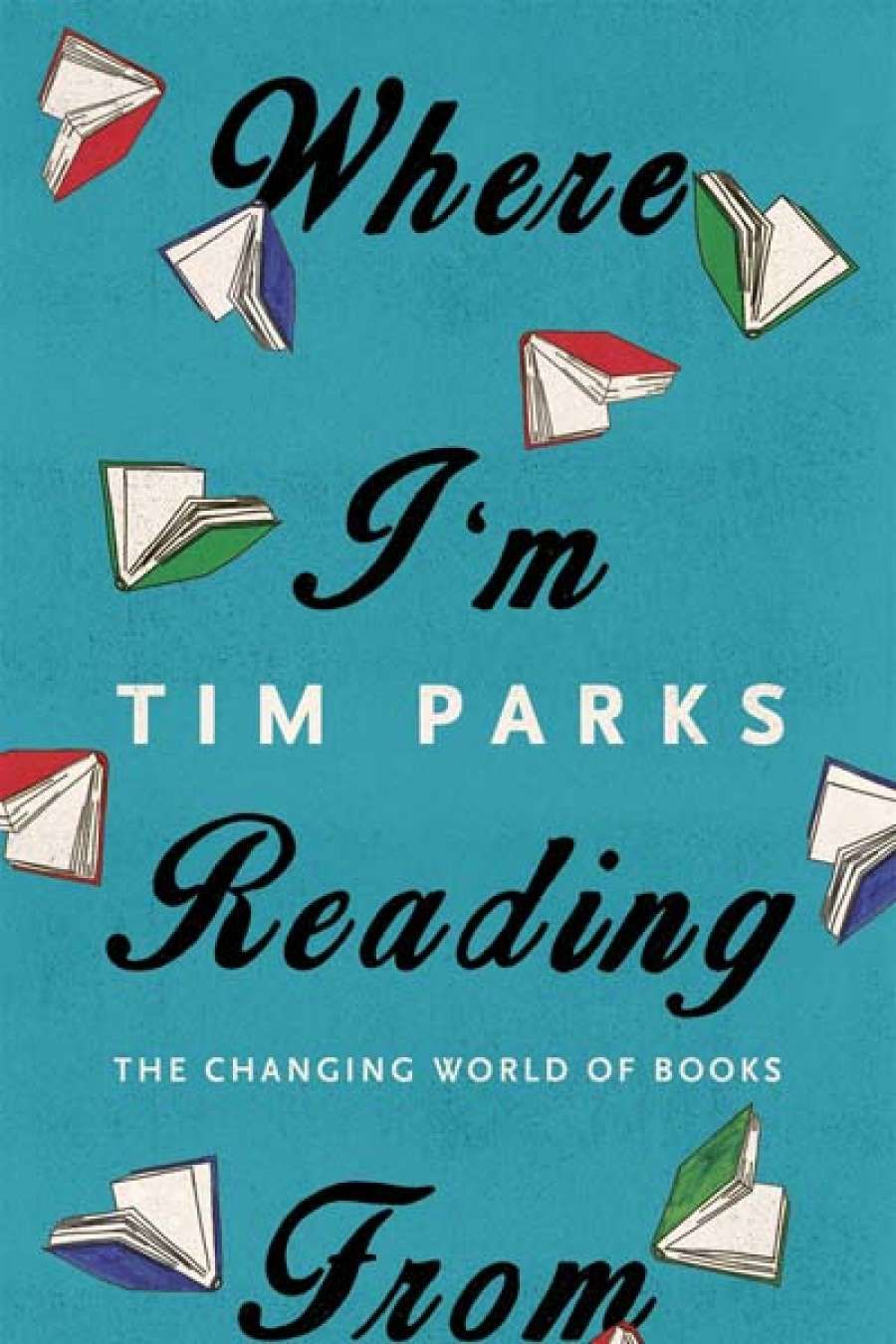
- Free Article: No
- Contents Category: Literary Studies
- Custom Article Title: Colin Steele reviews 'Where I'm Reading From' by Tim Parks
- Book 1 Title: Where I'm Reading From
- Book 1 Subtitle: The Changing World of Books
- Book 1 Biblio: Harvill Secker, $34.99 hb, 256 pp, 9781846559037
Parks asks lots of rhetorical questions, such as ‘Do We Need Stories?’, ‘Why Finish Books?’, ‘Does Copyright Matter?’ and ‘What Do We Want from Writing? Money? A Career? Recognition?’. In the titular essay, Parks reflects that he reviewed negatively William Giraldi’s novel Busy Monsters (2011) because it seemed ‘an exercise in literary exhibitionism’ and a ‘self-indulgent performance whose main intention was to encourage the reader to concede that the author was smart’. Parks seems to see no contradiction in the smartness and self-indulgence of many of his own comments and those he is criticising.
Parks would have disagreed with Giraldi’s essay in the New Republic (19 April 2015) on ‘Why We Need Physical Books’. Parks’s far too brief essay, ‘E-books Are for Grown-ups’, argues that only the actual text is sacrosanct, as the literary experience lies specifically in ‘the movement of the mind through a sequence of words from beginning to end’. His conclusion, that e-books are a ‘medium for grown-ups’, is another example of a provocative generalisation rather than the reasoned examination of an issue.
Parks is on firmer ground when he comments on the dramatic effects of the digital era, which he contends has induced a ‘state of constant distraction’. Now, ‘every moment of serious reading has to be fought for, if the “serious” novel is to survive’.
In ‘Your English Is Showing’, Parks highlights his concern that we are ‘heading for a new and rather different resolution of the tension between lingua franca and vernacular’. Research from his own university has shown how much Italian syntax has shifted towards English models over the last fifty years. He regrets that many European novelists now have to impose a structural ‘English skeleton’ beneath ‘the flesh of their vernaculars’ and deplores the rise of the global novel, with the ‘standardization and flattening’ of narrative and the disappearance of ‘national’ literary styles.
 Tim Parks
Tim Parks
While his comment that the book review sections of newspapers have been reduced to the ‘size of a postage stamp’ is headline-grabbing, there is no doubt that book review sections around the world have been significantly reduced. In Australia, the consolidation of the three, once separate and independently edited, book pages of The Sydney Morning Herald, The Age, and The Canberra Times has resulted in a significant reduction of reviews and differing viewpoints. Moreover, the centralised Fairfax reviews are distributed to more than 100 regional newspaper websites across Australia, filling the space once partly occupied by local book reviews.
Parks seems, at times, to be seeking to emulate the curmudgeonly British critic Jeremy Lewis: for instance, when he alleges that for contemporary London readers of Dickens ‘half the references mean nothing’. Academics in their ‘chloroformed sanctuary’ fare no better as ‘literary scholarship in the universities is impenetrable’. He is correct that many academic articles are not immediately accessible because they are written within the frameworks of the research publication criteria imposed by research councils and universities.
‘In Where I’m Reading From, Parks is certainly far from precious as he tilts against many literary windmills’
Parks’s favourite authors include Henry Green and Barbara Pym, but he doesn’t explain why in detail. Instead, we get comments like, ‘I believe, Pym and Green to be finer writers than many a worthy Nobel laureate, taking in the grand questions of the century.’ Parks spends more time on his dislikes, especially those writing within the context of the ‘dull new global novel’. Here, Salman Rushdie, Eleanor Catton, and Jonathan Franzen ‘float in the world mix rather than feed into the immediate experience of people in their own culture’.
The commercial success of the global novel clearly rankles with Parks. In ‘Does Money Make Us Write Better?’, he notes that there have been very few studies of the relationship between a writer’s work and income. He cites Randall Jarrell’s comment in 1965 that Christina Stead’s failure to find a regular publisher eventually had a detrimental effect on her writing, ‘making it shriller and more self-indulgent’.
No one will ever get bored with Where I’m Reading From. For all of the sweeping polemical generalisations, Parks is addressing important issues that require our constant attention in a rapidly changing global book environment.


Comments powered by CComment